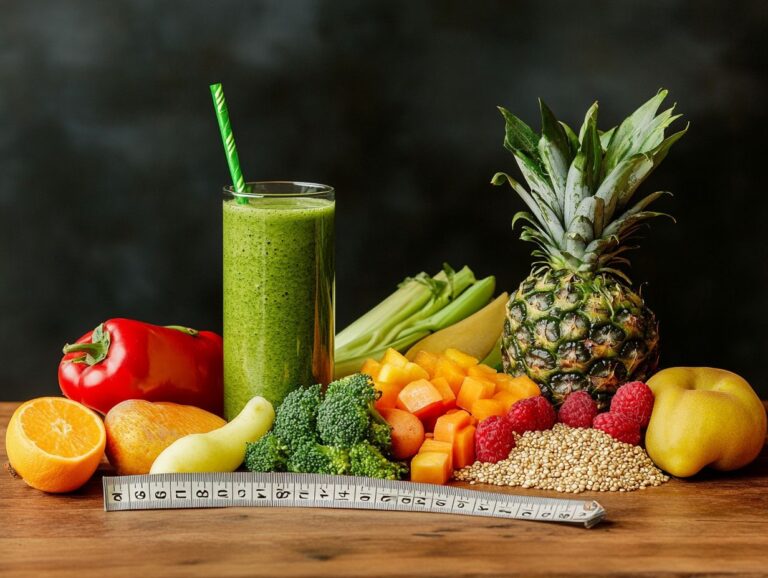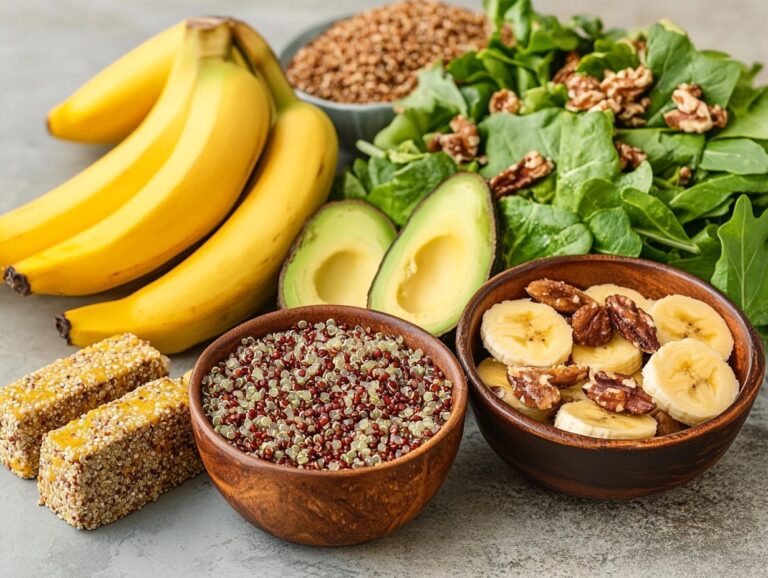Menopause is a natural phase of life that brings about various physical and emotional changes, often accompanied by symptoms such as hot flashes and mood swings. As women navigate this transition, diet can play a crucial role in managing these symptoms and promoting overall well-being. This article explores the impact of nutrition during menopause, with a focus on the benefits and potential risks associated with a vegan diet. It offers practical tips on which foods to include and avoid, assisting you in creating a supportive vegan diet plan for menopause. Discover how mindful eating can ease this transformative journey and enhance your quality of life.
What is Menopause?
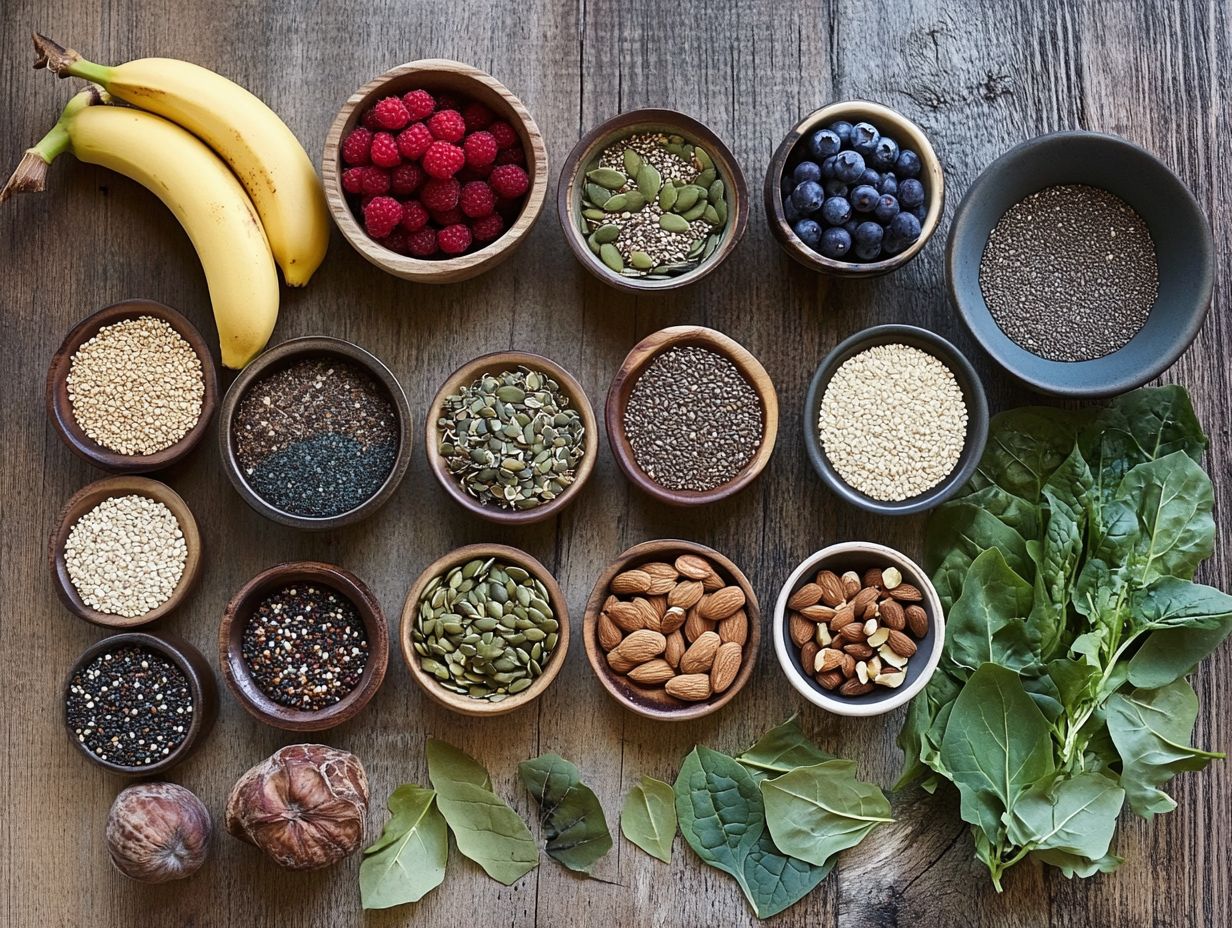
Menopause is defined as the point in time when a woman has not had a menstrual period for twelve consecutive months, marking the end of her ability to conceive naturally. This stage in a woman’s life is characterized by the cessation of ovulation and a decline in hormone production.
Menopause typically occurs in women during their late 40s to early 50s, and its symptoms can vary in intensity. This transition can significantly impact both physical and emotional health, making it advisable for women to consult with healthcare providers about managing any chronic diseases that may arise during this stage.
What Are the Symptoms of Menopause?
Menopause symptoms can vary significantly among individuals, but common experiences include hot flashes, night sweats, mood swings, weight gain, and sleep disturbances, all of which can negatively affect daily life. These symptoms arise partly due to the body’s adjustment to lower hormone levels and can lead to various physical and emotional challenges.
Therefore, it is important for women experiencing menopause to seek effective stress management techniques and make dietary changes to address potential nutritional deficiencies.
As these symptoms progress, they can trigger a cascade of other health issues, such as heightened anxiety, fatigue, and a general sense of loss of control. For instance, hot flashes can disrupt sleep patterns, leading to chronic fatigue and difficulties concentrating, while weight gain—often concentrated around the abdomen—can increase the risk of cardiovascular diseases.
Positive lifestyle changes, such as regular exercise and mindful eating, can help with weight management and improve mood stability. Incorporating stress management techniques, such as yoga or meditation, can enhance emotional resilience.
Additionally, a healthy diet rich in calcium and vitamins may alleviate some menopause symptoms and improve overall health and well-being during this transition.
How Does Diet Affect Menopause?
Diet plays a crucial role during menopause, as dietary changes can help women effectively manage symptoms such as hot flashes, weight gain, and mood swings.
Adopting a plant-based diet, such as the Mediterranean diet, can provide numerous health benefits for women in this stage. These advantages include improved hormone balance, enhanced overall health, and a reduced risk of chronic disease progression.
Therefore, it is essential to consider nutritional needs during this transitional period.
What Foods Should You Avoid During Menopause?
During menopause, women should avoid consuming processed foods, foods high in sugar and unhealthy fats, caffeine, and alcohol. These items can exacerbate menopausal symptoms such as weight gain, hormonal imbalances, hot flashes, mood swings, sleep disturbances, and anxiety. Therefore, it is essential for menopausal women to be mindful of their dietary choices in order to maintain a healthier lifestyle during this phase.
Eating healthy and balanced meals can help mitigate hormonal imbalances during menopause. According to the Mayo Clinic, opting for whole foods instead of processed foods can have a positive impact on health. Whole foods include:
- Fruits
- Vegetables
- Whole grains
- Lean proteins
- Healthy fats
These foods provide essential nutrients that can help women meet their nutritional needs and are associated with improved emotional well-being during menopause.
Furthermore, the Cleveland Clinic suggests that foods rich in phytoestrogens—plant compounds that mimic estrogen—such as soy products, flaxseeds, legumes, and whole grains, can help reduce some menopausal symptoms. Staying hydrated by drinking water and herbal teas is also crucial, as dehydration can exacerbate fatigue and trigger headaches.
What Foods Should You Include in Your Diet During Menopause?
Nutrient-dense foods play a crucial role in a menopausal diet, as they help manage menopausal symptoms and promote overall health. These foods are rich in essential vitamins, minerals, and phytoestrogens, which can assist in balancing hormone levels. A focus on protein-rich foods, calcium sources, and omega-3 fatty acids can help alleviate menopause symptoms, support bone health, and reduce the risk of chronic diseases.
A balanced menopausal diet should include several key food types essential for proper hormone balance and overall health support.
- Lean Proteins: Foods such as chicken, fish, legumes, eggs, nuts, and yogurt are rich in protein and vital for maintaining muscle mass and immunity. They provide necessary energy, which can be depleted during menopause.
- Calcium-Rich Foods: Dairy products, leafy greens like kale and spinach, and fortified milk, yogurt, and cheese alternatives are important sources of calcium. Calcium is crucial for maintaining bone density during menopause, as decreased estrogen levels can increase the risk of osteoporosis and fractures.
- Foods with Phytoestrogens: Soy products, flaxseeds, and whole grains contain phytoestrogens, which are plant-based compounds structurally similar to estrogen. These compounds can help relieve menopausal symptoms and have been associated with reduced hot flashes and improved heart health.
By incorporating a diverse range of these important food types into their diet, women can navigate the transition of menopause in a healthier manner.
What is a Vegan Diet?
A vegan diet is a plant-based diet that excludes all animal products, including meat, dairy, and eggs, and emphasizes whole foods such as fruits, vegetables, legumes, nuts, seeds, and grains.
This type of diet meets the nutritional needs of individuals seeking to improve their health and supports lifestyle changes that can reduce the risk of chronic illnesses, contributing to overall well-being.
What Are the Benefits of a Vegan Diet During Menopause?
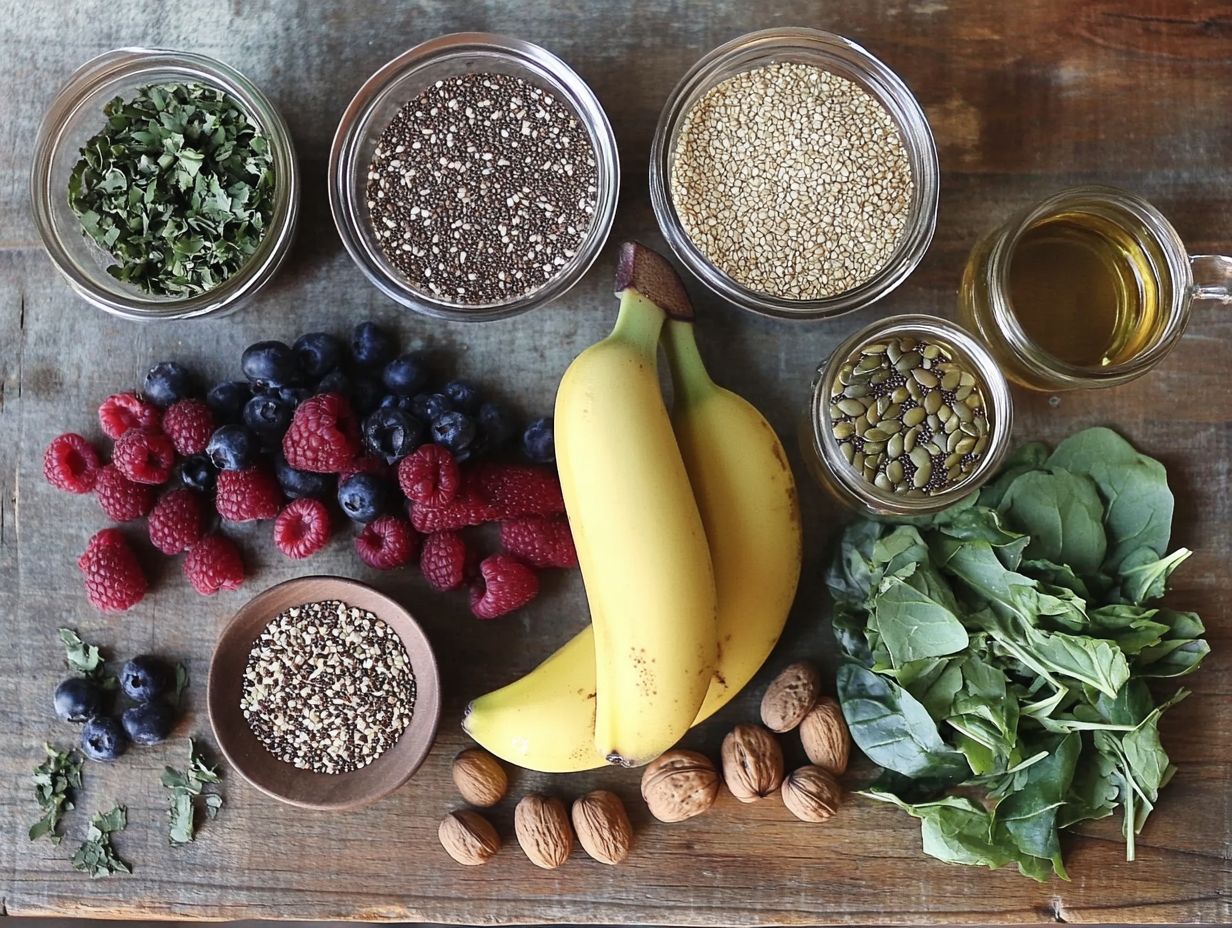
The benefits of a vegan diet during menopause include weight reduction and alleviation of menopause symptoms, largely due to the diet’s emphasis on foods that are naturally rich in essential vitamins and minerals.
Women who consume a diet high in fruits, vegetables, whole grains, and legumes may experience improved hormone balance and fewer hot flashes during menopause.
These plant-based foods are lower in saturated fats and are abundant in antioxidants and phytonutrients, which help reduce inflammation and promote cardiovascular health. Additionally, a vegan diet is higher in fiber, aiding digestion and assisting with weight management—a significant concern during this transitional period.
Nutritional superfoods such as flaxseeds and leafy greens provide essential omega-3 fatty acids and calcium, both of which contribute to bone density and mood stabilization.
In summary, adopting a vegan diet can lay the groundwork for a more positive menopausal experience, serving as a holistic approach to reducing symptoms while promoting long-term health.
What Are the Potential Risks of a Vegan Diet During Menopause?
A vegan diet offers numerous advantages, but it can also pose several risks if not followed properly, particularly regarding nutritional deficiencies that may arise without appropriate dietary adjustments.
Menopausal women should ensure their vegan diet includes adequate sources of key nutrients such as vitamin D, calcium, and B vitamins by consulting with healthcare providers to maintain their health during this transitional period. This is particularly important because the hormonal changes that occur during menopause increase women’s susceptibility to conditions like osteoporosis and cardiovascular disease.
To mitigate these risks, individuals should engage in meal planning that incorporates a diverse range of plant-based foods rich in these essential nutrients.
For instance, leafy greens, fortified plant milks, and legumes are excellent sources of calcium and vitamin D. Additionally, regularly including nuts, seeds, and whole grains can help boost the intake of B vitamins.
What Foods Should Be Included in a Vegan Menopause Diet Plan?
The vegan menopause diet plan encompasses a variety of food categories to ensure a balanced diet that provides all the essential nutrients women need.
Key food categories for a vegan menopause diet include:
- Whole grains
- Fruits and vegetables
- Plant-based proteins
- Healthy fats
1. Whole Grains
Whole grains play a vital role in a vegan menopause diet, as they are rich in fiber and essential nutrients that promote blood vessel health and aid digestion.
Foods such as quinoa, brown rice, and whole grain bread can help regulate blood sugar levels, which is crucial for managing weight and overall health during menopause.
Incorporating whole grains into one’s daily plant-based diet can significantly enhance cardiovascular health, a key consideration during the menopausal transition. The high fiber content of these grains helps lower cholesterol levels, thereby improving circulation and reducing the risk of heart disease.
This is particularly important, as hormonal changes associated with menopause can increase susceptibility to cardiovascular issues. Additionally, increasing fiber intake promotes a sense of fullness, making it easier to manage weight gain and maintain a healthy body weight during periods of hormonal fluctuation.
Consuming a variety of whole grains allows individuals to enjoy different flavors and textures while supporting their overall health and well-being during a time when balanced nutrition is essential.
2. Fruits and Vegetables
A vegan diet for menopause should include a colorful array of fruits and vegetables, as they are rich in antioxidants, vitamins, and minerals that support overall health and help alleviate menopause symptoms. This includes the consumption of calcium sources, iron sources, and protein-rich foods for meeting nutritional needs.
Leafy greens, berries, and cruciferous vegetables are especially beneficial because they offer a variety of nutrients that can enhance mood and energy levels. Incorporating a wide and vibrant selection of produce not only adds variety to meals but also ensures a broader range of nutrients.
For instance, orange and yellow fruits like carrots and mangoes are high in beta-carotene, while purple fruits and vegetables such as eggplants and grapes contain flavonoids that can help reduce oxidative stress.
This diverse mix is essential for maintaining heart health and improving bone density, both of which are critical during menopause.
3. Plant-based Proteins
Plant-based proteins play a crucial role in a vegan menopause diet. Not only do they provide the adequate protein intake necessary for maintaining muscle health, but they also support hormone balance.
Excellent sources of protein include lentils, chickpeas, tofu, and tempeh, which offer health benefits associated with phytoestrogens that may help alleviate hot flashes. Incorporating these protein sources into daily meals enhances overall nutrition and helps preserve muscle mass, a particularly important consideration during menopause when hormonal changes can contribute to muscle loss.
Additionally, quinoa and edamame are nutrient-dense options that contain a complete amino acid profile, promoting recovery and physical wellness.
Beyond protein, plant-based diets are rich in vitamins, minerals, and fiber, all of which are essential for managing menopausal symptoms. Adequate fiber intake is especially important, as it can help lower the risk of heart disease, assist in weight management, improve bone density, and support digestive health.
A varied diet ensures a balanced intake that supports both physical and hormonal well-being during menopause.
4. Healthy Fats
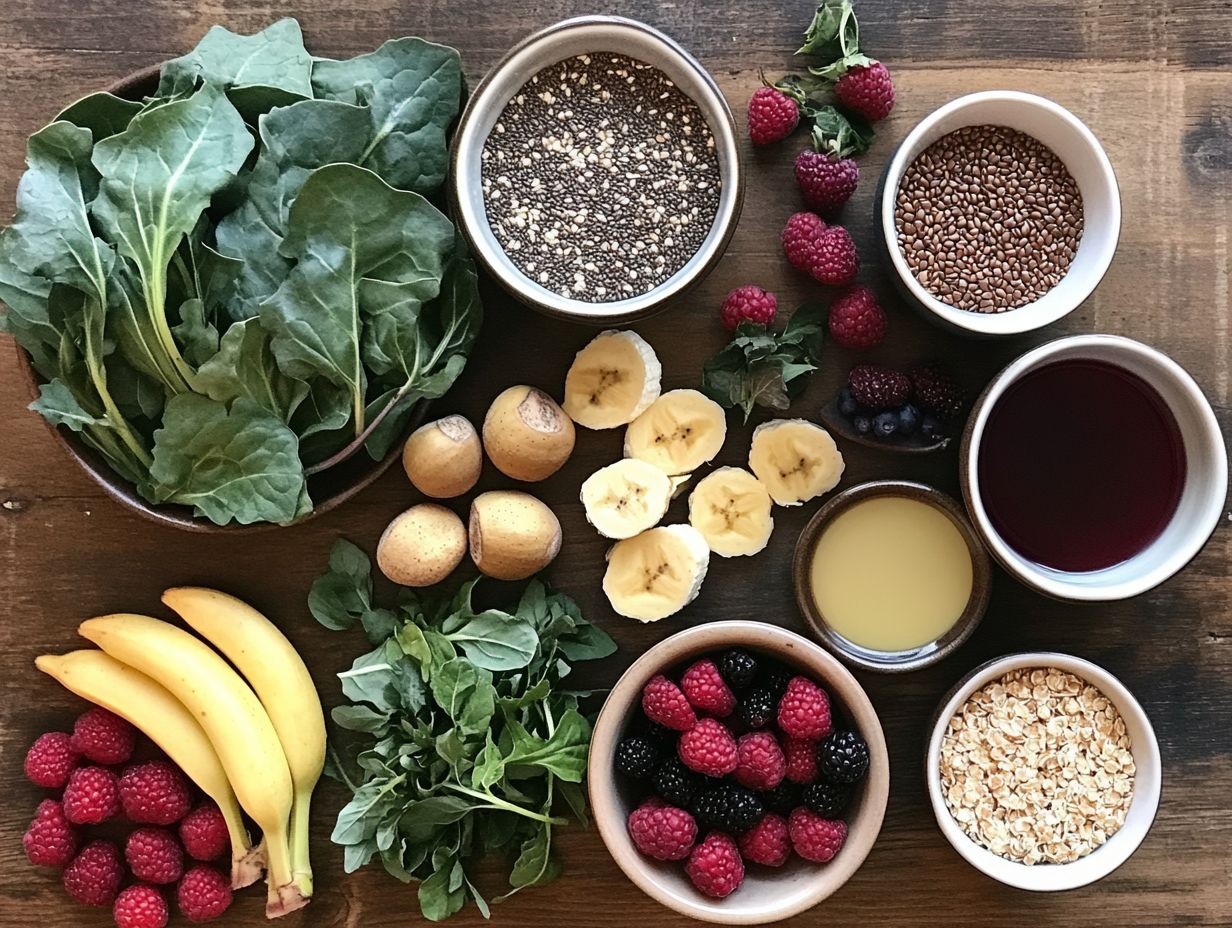
The benefits of healthy fats in a vegan diet during menopause include supporting hormone production, enhancing brain health, and promoting overall well-being. Including omega-3 fatty acids from plant-based sources like walnuts and flaxseeds can further support hormone levels and blood vessel health.
Healthy fats sourced from avocados, nuts, seeds, and omega-3 fatty acids from flaxseeds or chia seeds can improve mood and reduce inflammation during this transitional period. Additionally, these nutrient-dense foods provide the energy women need and promote heart health, which is particularly important during menopause.
Women experiencing menopause can also benefit from the anti-inflammatory properties of these fats, helping to alleviate symptoms such as hot flashes and joint pain. Other plant-based sources, such as walnuts and hemp seeds, are rich in omega-3 fatty acids, which help protect against cognitive decline.
By including healthy fats, those adopting a vegan lifestyle can navigate menopause more comfortably while enjoying a diverse range of flavors in their meals.
5. Calcium-rich Foods
Calcium-rich foods are essential for menopausal women as they help maintain bone strength and prevent osteoporosis, making them a crucial component of a vegan menopause diet.
Fortified plant-based milks, leafy greens, tofu, and fortified cereals can provide the adequate calcium levels necessary to support bone health during this transitional phase. Including sources of calcium not only improves bone density but also plays a role in regulating other bodily functions, which can be particularly important during menopause. Soy products like tofu and tempeh are also excellent sources of calcium and phytoestrogens that aid in managing menopause symptoms.
For instance, almonds and sesame seeds are excellent additions to the diet because they offer calcium along with healthy fats that promote overall wellness. Incorporating legumes like chickpeas and lentils provides the added benefit of calcium along with other important nutrients.
It is also vital to include vitamin D-rich foods to enhance calcium absorption; items such as fortified orange juice or adequate sunlight exposure can further support these dietary efforts.
6. Vitamin D Sources
Vitamin D is one of the most essential vitamins for menopausal women, as it aids in calcium absorption and is crucial for maintaining bone health. Therefore, it is important to include sources of vitamin D in a vegan diet. This can be achieved through dietary adjustments like incorporating fortified foods and nutritional yeast.
Natural dietary sources of vitamin D are limited, so individuals may need to supplement, consume fortified foods, or ensure adequate exposure to sunlight to meet their requirements.
Along with supporting bone health, vitamin D also bolsters the immune system and can help alleviate some menopause-related symptoms, such as mood changes and fatigue. For those who spend significant time indoors or live in areas with limited sunlight, it becomes even more critical to adopt lifestyle choices that enhance vitamin D intake.
Good sources of vitamin D include:
- Fortified plant-based milk
- Cereals
- Nutritional yeast
Additionally, spending 15 to 30 minutes outdoors on sunny days can provide valuable opportunities for natural vitamin D synthesis, depending on skin type and weather conditions.
How Can a Vegan Diet Help with Menopause Symptoms?
A well-planned vegan diet can effectively manage menopause symptoms such as hot flashes, weight gain, and mood swings by supplying essential nutrients that support hormonal balance and overall well-being.
Research indicates that whole, plant-based foods can significantly improve the quality of life for menopausal women and provide relief from symptoms. Healthcare providers often recommend dietary changes to include nutrient-dense foods and avoid processed foods to prevent nutritional deficiencies and chronic diseases.
1. Reducing Hot Flashes
A vegan diet high in phytoestrogens from sources such as soy products and legumes may help reduce the severity and frequency of hot flashes in menopausal women. In addition, consuming cooling foods and staying hydrated are effective strategies for managing this common symptom. Dietary changes to include fruits and vegetables like leafy greens and nuts and seeds can also contribute to stress management and weight loss.
Although long-term studies on the impact of a vegan diet on hot flashes have yet to be conducted, the beneficial effects of phytoestrogens on menopausal symptoms are well documented. According to a 2012 review published in the journal Menopause, phytoestrogens were found to reduce the frequency of hot flashes by 26%.
A 2015 study in the journal Nutrition and Food Science aimed to build on these findings by comparing the severity of hot flashes in women who consumed a high amount of phytoestrogens with those who consumed a low amount. The authors concluded that consuming phytoestrogen-rich foods does not significantly impact the severity of hot flashes, suggesting that longer-term studies may provide different results.
Vegan diets typically include a wide variety of fruits and vegetables, particularly those with a natural cooling effect that can help alleviate hot flashes during menopause. These foods include:
- Cucumbers
- Watermelon
- Green leafy vegetables
- Celery
- Cauliflower
- Carrots
- Apples
- Oranges
- Citrus fruits
- Strawberries
- Raspberries
- Peppers
- Radishes
Additionally, using cooling spices such as mint and coriander in cooking can be beneficial. Mint and chamomile tea, when consumed without milk, are excellent choices for helping to keep the body cool.
Staying hydrated is also a crucial aspect of managing hot flashes. Drinking plenty of water and natural herbal teas aids the body in regulating its temperature, which can help minimize discomfort during hot flashes.
2. Managing Weight Gain
A vegan diet that is rich in nutrient-dense foods, combined with regular physical activity, can effectively support weight management during menopause by providing the necessary calories and nutrients without unnecessary added calories. Implementing meal planning and cooking techniques that prioritize healthy fats and avoid processed foods can further enhance weight management results.
By implementing meal planning strategies that include whole grains, fruits, and vegetables, menopausal women can achieve their weight management goals while also benefiting from the preventive and therapeutic health advantages of a vegan diet. Incorporating B vitamins and ensuring adequate hydration can also support energy levels and overall health.
This approach helps limit total calorie intake by replacing high-calorie foods with high-fiber alternatives, which promote feelings of fullness and may help prevent overeating and poor snacking choices.
For optimal weight management, meal planning should incorporate lean sources of plant protein, such as legumes, nuts, and seeds. Additionally, practicing mindful eating—such as eating slowly and focusing on flavors—can enhance the enjoyment of meals and support weight maintenance or loss.
Alongside a healthy diet, engaging in regular physical activity, such as walking, yoga, or strength training, helps burn excess calories and contributes to improved mood and energy levels, making the menopausal experience more enjoyable.
3. Improving Mood and Energy Levels
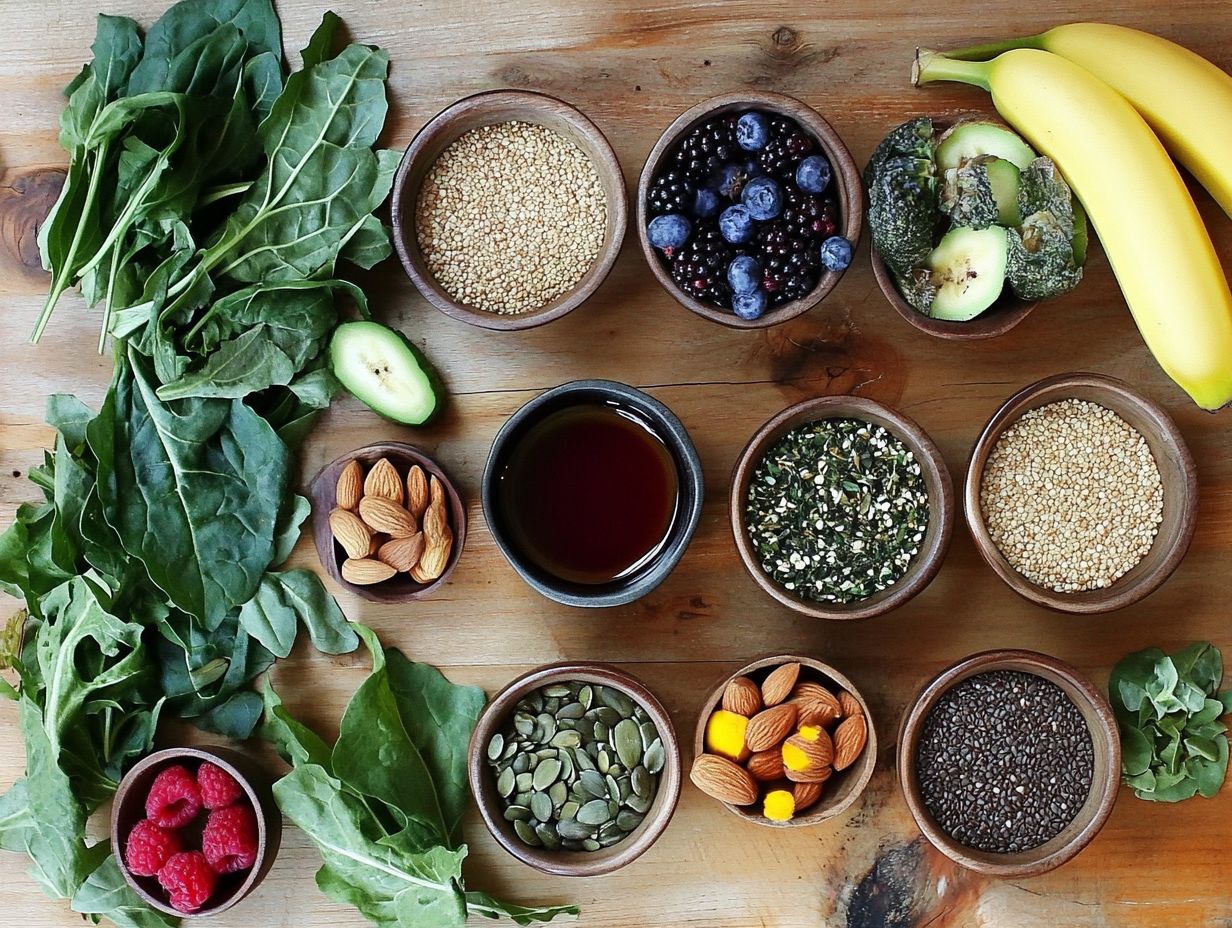
A well-balanced vegan diet, rich in nutrient-dense foods such as legumes and nuts and seeds, can significantly improve mood and energy levels during menopause, as the B vitamins and other essential nutrients found in plant foods are crucial for mental and emotional health.
Incorporating stress management strategies, such as deep breathing exercises and physical activity, can further enhance mental well-being and vitality. The vibrant fruits and vegetables in a vegan diet provide antioxidants that combat oxidative stress and contribute to hormonal balance, which is especially important for menopausal women during this transitional period.
For many individuals experiencing menopause, the decline in estrogen and progesterone can result in mood swings and fatigue, making a nutrient-rich plant-based diet, including phytoestrogens found in soy products, vital for maintaining consistent energy levels.
Mindfulness practices like yoga and meditation can complement a healthy diet by promoting relaxation and reducing stress. Together, a well-balanced plant-based diet and effective stress management strategies offer a holistic approach to navigating the challenges of menopause symptoms, helping individuals feel more stable and energized in their daily lives.
4. Supporting Bone Health with Dietary Changes
A vegan diet that includes sufficient sources of calcium, such as fortified plant milks and leafy greens, and vitamin D is essential for supporting the bone health of menopausal women, who are at an increased risk of developing osteoporosis.
Adequate intake of calcium and vitamin D, combined with regular exercise and protein-rich foods like tofu and tempeh, can help improve bone density and reduce the risk of fractures during this period. Hormonal changes during menopause lead to reduced bone mass, making it crucial for women to pay attention to their eating habits, including dietary adjustments.
Effective sources of calcium include:
- leafy green vegetables
- fortified plant milks
- tofu
Exposure to direct sunlight and/or supplementation can help maintain adequate levels of vitamin D, which is necessary for calcium absorption. Weight-bearing exercises, such as walking or dancing, not only help build strength but also enhance cardiovascular health.
This combination of a well-balanced diet and regular exercise enables women to take control of their bone health during this transitional phase.
What Other Lifestyle Changes Can Support a Vegan Menopause Diet Plan and Overall Health?
Along with following a vegan menopause diet, adopting other lifestyle changes, such as incorporating healthy fats like omega-3 fatty acids and reducing processed foods, can enhance the effectiveness of dietary practices and improve overall health during menopause.
Regular exercise, effective stress management, adequate hydration, and sufficient sleep are all crucial for managing menopause symptoms, preventing weight gain, and promoting a healthier lifestyle.
1. Regular Exercise
Regular exercise has a positive impact on menopause and is essential for managing symptoms, maintaining weight, supporting blood vessel health, and promoting overall health.
Activities such as walking, swimming, and strength training can significantly enhance mood, energy levels, and general well-being during this transitional period, potentially aiding in weight loss.
Additionally, practices like yoga and Pilates can improve flexibility and reduce stress, which is crucial for alleviating hot flashes and insomnia that often accompany menopause, while also contributing to better hormone levels.
Aerobic exercises, such as dancing and cycling, contribute to better cardiovascular health and help prevent osteoporosis, a common concern for women in this stage of life, especially when combined with nutrient-dense foods such as quinoa and lentils.
It’s also important to note that participating in group classes or community exercises can provide social support, which helps women stay motivated and committed to their fitness routines.
By choosing a variety of enjoyable physical activities and incorporating dietary changes, menopausal women can effectively manage their symptoms and enhance their overall quality of life.
2. Stress Management Techniques
Stress management techniques, such as deep breathing exercises, yoga, and mindfulness practices, are essential for menopausal women as they help reduce mood swings and other symptoms associated with menopause, and may also support environmental considerations by promoting sustainable living.
By implementing these techniques, including meal planning and cooking techniques that emphasize whole, unprocessed foods, menopausal women can achieve improved emotional well-being and enhance their quality of life during this transitional phase.
3. Adequate Sleep
Sleep is crucial for managing menopause symptoms, as sleep disturbances are common during the menopausal transition and can adversely affect overall health and emotional well-being, potentially leading to nutritional deficiencies.
Implementing good sleep hygiene practices, along with stress management techniques, can help women experiencing menopause improve their sleep quality, alleviate symptoms such as hot flashes and mood swings, and address specific nutritional needs.
Hormonal changes during menopause often lead to difficulties in falling asleep or staying asleep, which can contribute to fatigue and irritability.
To enhance sleep quality, women should consider:
- Maintaining a consistent sleep schedule
- Establishing a relaxing pre-bedtime routine
- Creating a comfortable sleep environment
- Incorporating magnesium-rich foods such as chickpeas and fortified cereals
Mindfulness meditation or gentle yoga can be beneficial for calming the mind before bed. Additionally, avoiding caffeine and heavy meals in the evening can promote better sleep, ultimately improving mood and overall well-being for women during menopause, while also supporting healthcare providers’ advice to manage chronic diseases.

